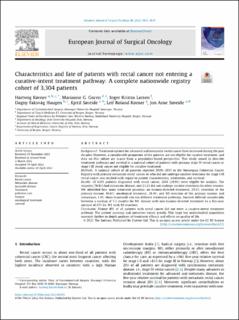Characteristics and fate of patients with rectal cancer not entering a curative-intent treatment pathway: A complete nationwide registry cohort of 3,304 patients
Kørner, Hartwig; Guren, Marianne; Larsen, Inger Kristin; Haugen, Dagny Renata Faksvåg; Søreide, Kjetil; Kørner, Leif Roland; Søreide, Jon Arne
Journal article, Peer reviewed
Published version

Åpne
Permanent lenke
https://hdl.handle.net/11250/3017748Utgivelsesdato
2022Metadata
Vis full innførselSamlinger
- Department of Clinical Medicine [2066]
- Registrations from Cristin [9791]
Originalversjon
European Journal of Surgical Oncology. 2022, 48 (8), 1831-1839. 10.1016/j.ejso.2022.04.013Sammendrag
Background: Treatment options for advanced and metastatic rectal cancer have increased during the past decades. However, a considerable proportion of the patients are not eligible for curative treatment, and data on this subset are scarce from a population-based perspective. This study aimed to describe treatment pathways and survival in a national cohort of patients with primary stage IV rectal cancer or stage I-III rectal cancer not eligible for curative treatment.
Methods: A national cohort of all patients reported 2008–2015 to the Norwegian Colorectal Cancer Registry with primary metastatic rectal cancer or who did not undergo curative resections for stage I-III rectal cancer was studied with regard to patient characteristics, treatments, and survival.
Results: Of 8291 patients diagnosed with rectal cancer, 3304 (39.9%) were eligible for analysis. The majority (76.8%) had metastatic disease, and 23.2% did not undergo curative resections for other reasons. We identified four main treatment journeys: no tumour-directed treatment, 25.1%; resection of the primary tumour, 44.6%; oncological treatment, 28.4%; and R0 resection of the primary tumour and metastases, 1.9%; these translated into ten different treatment pathways. Survival differed considerably between a median of 5.3 months for M1 disease with non-tumour-directed treatment to a five-year survival of 67% for M1 with R0 resection.
Conclusion: Almost 40% of all patients with rectal cancer did not enter a curative-intent treatment pathway. The patient journeys and outcomes varied greatly. This large but understudied population warrants further in-depth analyses of treatment efficacy and effects on quality of life.
